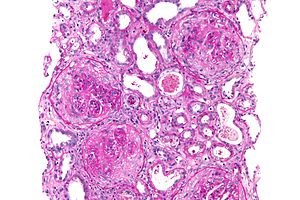Goodpasture's syndrome
| Goodpasture syndrome | |
|---|---|
 |
|
| Micrograph of a crescentic glomerulonephritis that was shown to be antiglomerular basement membrane disease, PAS stain | |
| Classification and external resources | |
| Specialty | rheumatology |
| ICD-10 | M31.0 (ILDS M31.010) |
| ICD-9-CM | 446.21 |
| OMIM | 233450 |
| DiseasesDB | 5363 |
| MedlinePlus | 000142 |
| eMedicine | med/923 ped/888 |
| MeSH | D019867 |
Goodpasture syndrome (GPS; also known as Goodpasture’s disease, antiglomerular basement antibody disease, or anti-GBM disease) is a rare autoimmune disease in which antibodies attack the basement membrane in lungs and kidneys, leading to bleeding from the lungs and kidney failure. It is thought to attack the alpha-3 subunit of type IV collagen, which has therefore been referred to as Goodpasture's antigen. Goodpasture syndrome may quickly result in permanent lung and kidney damage, often leading to death. It is treated with immunosuppressant drugs such as corticosteroids and cyclophosphamide, and with plasmapheresis, in which the antibodies are removed from the blood.
The disease was first described by an American pathologist Ernest Goodpasture of Vanderbilt University, in 1919 and was later named in his honor.
The antiglomerular basement membrane (GBM) antibodies primarily attack the kidneys and lungs, although, generalized symptoms like malaise, weight loss, fatigue, fever, and chills are also common, as are joint aches and pains. 60 to 80% of those with the condition experience both lung and kidney involvement; 20-40% have kidney involvement alone, and less than 10% have lung involvement alone. Lung symptoms usually antedate kidney symptoms and usually include: coughing up blood, chest pain (in less than 50% of cases overall), cough, and shortness of breath. Kidney symptoms usually include blood in the urine, protein in the urine, unexplained swelling of limbs or face, high amounts of urea in the blood, and high blood pressure.
...
Wikipedia
